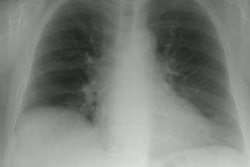J Thorac Imaging 1992 Mar;7(2):30-45
Pulmonary manifestations of scleroderma.
Arroliga AC, Podell DN, Matthay RA
Scleroderma is a severe systemic collagen vascular disease of unknown cause characterized by marked vascular and connective tissue abnormalities. The lungs are commonly involved in scleroderma, ranking only behind the skin, the peripheral vasculature, and the esophagus in frequency of organ involvement. Respiratory symptoms are, in a very few cases, the presenting manifestation of the disease. Abnormalities of pulmonary function in affected patients include a restrictive ventilatory defect, air flow obstruction, and a depressed diffusing capacity for carbon monoxide, which may be an isolated early finding. Interstitial lung disease and honeycombed lung are the most common pulmonary parenchymal abnormalities seen on chest radiographs. Enlargement of the cardiac silhouette and pulmonary artery due to scleroderma-induced pulmonary vascular disease is also noted. High-resolution computed tomography (HRCT) apparently is a sensitive, potentially useful technique for detecting occult interstitial lung disease in patients with scleroderma. Bronchoalveolar lavage usually shows an increase in total cell count and in the percentage of granulocytes; occasionally, there is a predominantly mononuclear (lymphocytic) cell alveolitis. Premortem and postmortem studies reveal two predominant lung lesions: (1) interstitial lung disease and (2) pulmonary vascular disease. Pulmonary vascular disease may occur in the absence of interstitial lung disease, particularly in patients with limited, as opposed to diffuse, scleroderma. The overall mortality rate in scleroderma is 50% at 7 years, and pulmonary complications are the major cause of death. No prospective, well-controlled studies have established that treatment alters the natural course of pulmonary disease in patients with scleroderma. Both D-penicillamine and cyclophosphamide have shown promise for treating patients with interstitial lung disease, and nifedipine may be useful for treating patients with early pulmonary vascular disease.
PMID: 1578524, MUID: 92251858

